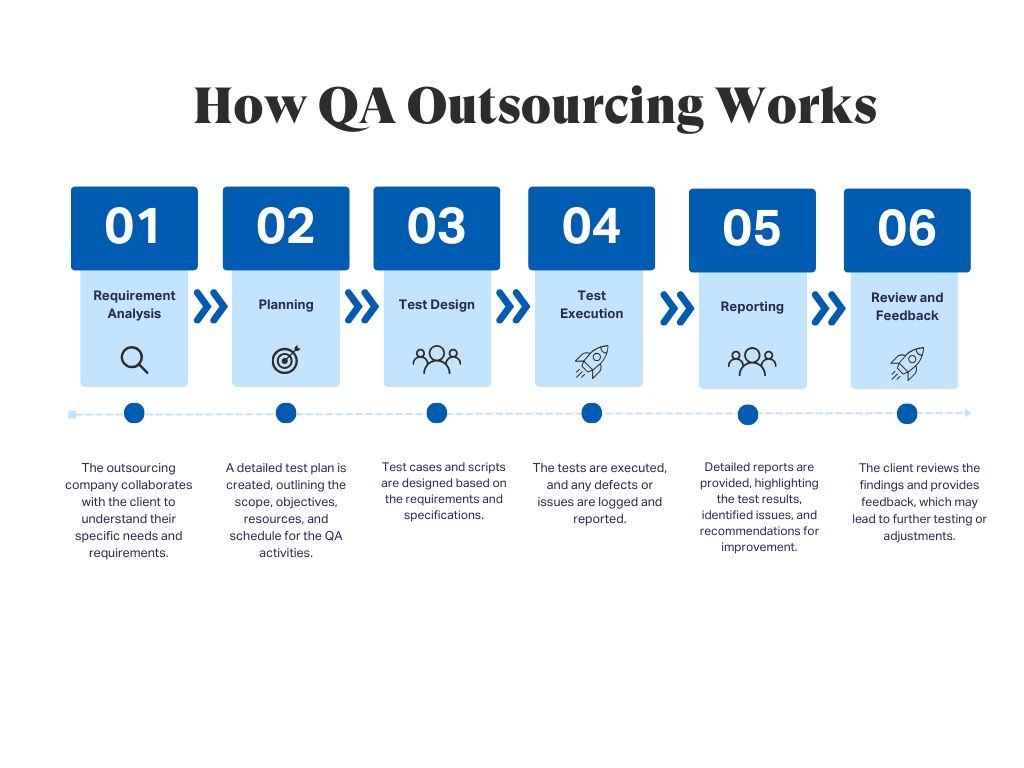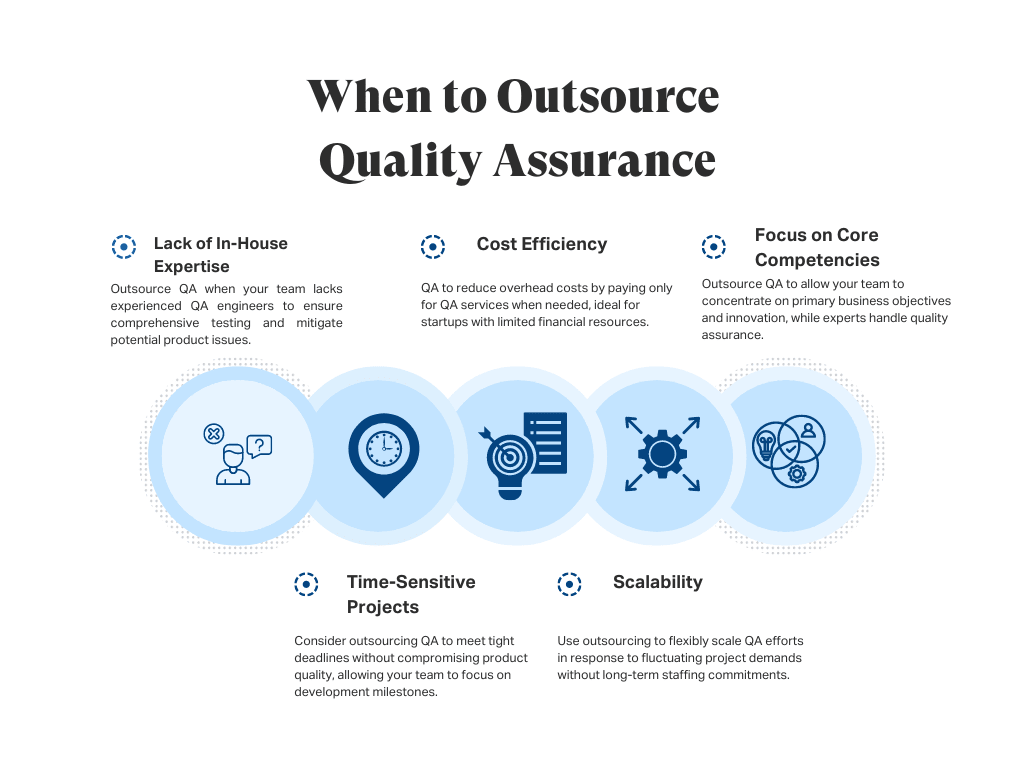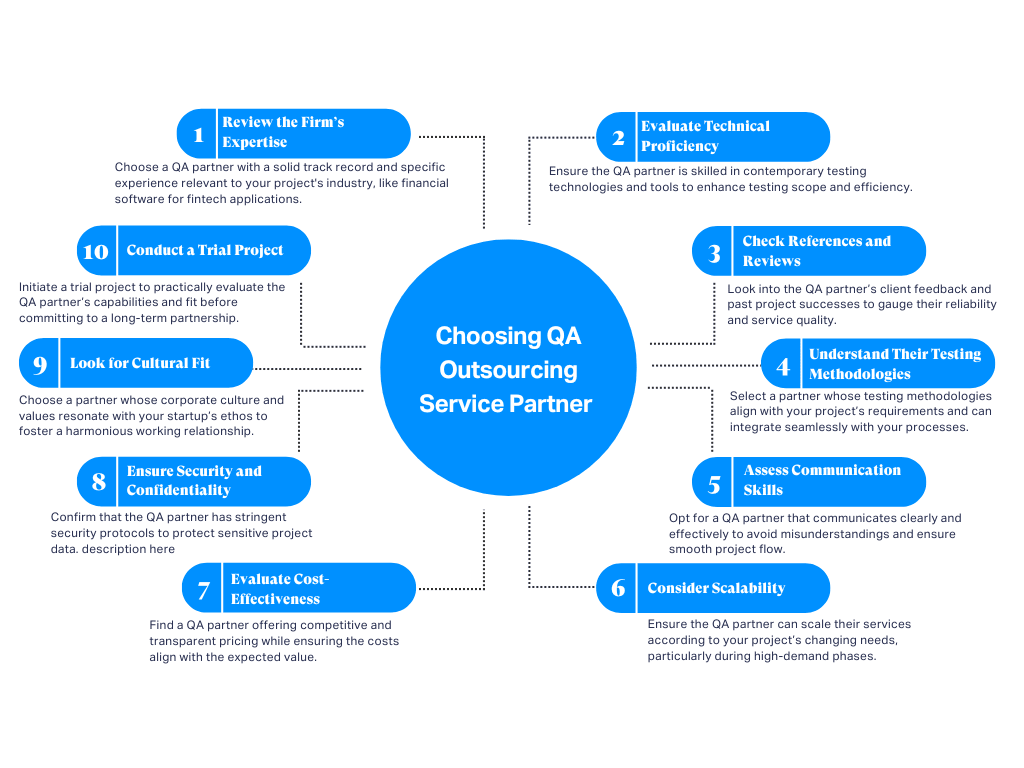QA Outsourcing: Why Startups Should Be Outsourcing

Outsourcing quality assurance (QA) has become a strategic requirement for many businesses. By outsourcing QA services, companies can save up to 30% on operational costs, and businesses that outsource QA report a 20-30% increase in efficiency and productivity.
Therefore, if your AWS bill is on fire, suddenly, your all-hands meetings take up multiple screens on Zoom. Users are doubling, and your investors are thrilled to see your startup hitting its stride. But your rapid growth has led to a couple of scary-looking bugs in production.
Users in new locations and on previously unseen devices are popping up in your activity log. Your unit tests aren’t cutting it anymore, and an untimely bug puts your growing user base at risk. One alternative is to partner with a crowd-testing vendor. For many companies like yours, outsourcing QA is a great choice – economically and for coverage, quality, and speed.
This article explores the crucial role of QA outsourcing for startups, discussing its benefits, timing, and how it improves product quality and market readiness. We’ll also examine key factors to consider when selecting a QA outsourcing partner.
What is QA Outsourcing?
QA outsourcing refers to hiring external companies to handle quality assurance (QA) tasks for a business. This approach allows companies to use specialized expertise, tools, and processes to make sure that their software meets the highest quality standards.

QA outsourcing companies provide a range of services designed to ensure that software and products are free from defects and meet user expectations.
These services typically include:
- Functional Testing: Verifying that the software functions as expected and meets all specified requirements.
- Performance Testing: Assessing the software’s performance under various conditions to ensure it can handle expected loads.
- Security Testing: Identify vulnerabilities and ensure the software is secure against potential threats.
- Usability Testing: Evaluating the software’s user interface and user experience to ensure it is intuitive and user-friendly.
- Automation Testing: Using automated tools to execute tests, which can increase efficiency and coverage.
- Regression Testing: Ensuring that new code changes do not negatively impact existing functionality.
- Compatibility Testing: Checking that the software works across different devices, browsers, and operating systems.
When To Outsource Quality Assurance
Outsourcing quality assurance (QA) can be an important decision for startups looking to balance growth and efficiency. By using external expertise, startups can overcome common challenges such as limited in-house resources, tight project timelines, and budget constraints.
Here are some key points to consider when deciding the right time to outsource QA.

Lack of In-House Expertise
Many startups hire inexperienced QA engineers, which can result in insufficient testing and problems with their software. A startup developing a mobile app may not have experienced QA engineers on their team.
Outsourcing QA can provide access to experts specializing in mobile app testing, ensuring the app is thoroughly tested for functionality, performance, and security.
Time-Sensitive Projects
When your development team is working under tight deadlines, outsourcing quality assurance can help ensure that the quality of the product is not compromised due to time constraints.
This allows your team to focus on meeting the project deadlines while the QA team ensures the product meets the required standards.
Cost Efficiency
Hiring a full-time, in-house QA team can be expensive, especially for startups with limited resources. Outsourcing can be a more cost-effective solution.
It allows the startup to pay for QA services only when needed, reducing overhead costs and allowing them to allocate funds to other critical areas like development and marketing.
Scalability
Startups may need to scale their QA efforts up or down based on project demands. Outsourcing provides this option without long-term commitments. A startup might need more QA resources during peak development phases than usual.
Outsourcing provides the flexibility to scale QA efforts up or down based on the project’s needs without the long-term commitment of hiring additional full-time staff.
Focus on Core Competencies
Startups should focus on their core activities and strengths. Outsourcing QA allows them to concentrate on innovation and development. A startup focused on innovative product development might prefer concentrating on core activities rather than managing QA processes. Outsourcing QA allows the internal team to focus on what they do best while the external team handles the testing.
Benefits Of QA Outsourcing Services
Outsourcing offers several benefits of quality assurance for businesses, particularly startups and small companies. By using external expertise, companies can achieve global reach at a lower cost, enhance productivity, and optimize resources.
Let’s talk about the advantages in more detail:
Global Reach at Low Cost
Startups with limited resources can access a worldwide network of expert testers and various device labs through outsourcing. This ensures high-quality user experiences across different platforms and locations without a big investment.
Additionally, outsourcing allows for testing in different time zones, providing round-the-clock coverage and faster turnaround times.
Better Productivity
Companies use QA outsourcing to let their developers focus more on coding and less on testing. This increases productivity and speeds up development, reducing burnout and increasing job satisfaction.
Developers can dedicate more time to innovation and improving core functionalities, leading to better overall product quality.
Cost Savings and Resource Optimization
Outsourcing QA can save a lot of money, with some clients seeing a 30-45% cost reduction compared to in-house QA. These savings come from lower recruitment, training, and technology costs, allowing startups to invest in growth and innovation.
Additionally, outsourcing eliminates the need for expensive testing infrastructure and software licenses, further reducing overheads.
High-Quality Testing
Professional outsourced teams bring expertise and an objective view, improving software quality. They use proven methods to conduct thorough testing, identifying more defects before release and reducing post-launch issues.
These teams often have specialized skills and experience in various testing domains, ensuring comprehensive coverage and high-quality outcomes.
Risk Management
Outsourcing QA helps identify potential risks early, allowing for timely fixes and protecting the company’s reputation. External QA teams can provide an unbiased assessment of the software, identifying vulnerabilities and ensuring compliance with industry standards and regulations.
Choosing A QA Outsourcing Service Partner
Choosing the right QA outsourcing service partner is crucial for enhancing the quality and reliability of your product. A well-chosen partner can bring expertise, advanced technology, and efficient testing methodologies to your project.
By carefully analyzing these aspects, you can find a QA partner that aligns with your project needs and helps you achieve your quality assurance goals.
Here are some factors you should consider when choosing a QA outsourcing partner:

Review the Firm’s Expertise
Look for a partner with a proven track record in QA services. Their experience in handling similar projects can be of great value. If you’re developing a fintech application, choose a QA partner with extensive experience in financial software testing. They will be familiar with industry-specific regulations and standards, ensuring thorough and compliant testing.
Evaluate Technical Proficiency
Check whether the partner has expertise in the latest testing tools and technologies. This will help in conducting comprehensive and efficient testing. A QA partner proficient in automated testing tools like Selenium or Appium can significantly speed up the testing process and improve accuracy, especially for large-scale applications.
Check References and Reviews
Positive feedback and successful project outcomes are good indicators of a reliable partner. Investigate the partner’s reputation by checking client testimonials, case studies, and reviews. This provides insights into their reliability and quality of service. Reach out to previous clients of the QA partner to understand their experience.
Understand Their Testing Methodologies
Different projects require different testing approaches. Ensure the partner uses methodologies that align with your project needs. For an agile development environment, a QA partner experienced in agile testing methodologies can easily integrate with your development process, providing continuous testing and feedback.
Assess Communication Skills
Effective communication is key to a successful partnership. The QA partner should be able to clearly convey testing results, issues, and recommendations. During the initial discussions, consider how well the QA partner communicates. Clear and prompt communication can prevent misunderstandings and ensure smooth project execution.
Consider Scalability
Your QA demands may vary over time. Choose a partner who can scale their services up or down based on your requirements. If you anticipate a major product launch, ensure the QA partner can quickly ramp up their resources to handle the increased testing workload.
Evaluate Cost-Effectiveness
While cost shouldn’t be the only factor, it’s important to find a partner who offers good value for money. Compare pricing models and ensure there are no hidden costs. Some QA partners offer flexible pricing models, such as pay-as-you-go or fixed-price contracts. Choose a model that aligns with your budget and project scope.
Ensure Security and Confidentiality
Your QA partner will have access to sensitive information. Ensure they have robust security measures in place to protect your data. Verify that the QA partner complies with industry standards for data security and confidentiality, such as ISO/IEC 27001 certification.
Look for Cultural Fit
A good cultural fit can enhance collaboration and ensure a smoother working relationship. Consider the partner’s work culture, values, and approach to problem-solving. If your startup values innovation and agility, choose a QA partner who shares these values and can adapt quickly to changing requirements.
Conduct a Trial Project
Before committing to a long-term partnership, consider running a small trial project. This allows you to evaluate the partner’s capabilities and working style. Assign a small, non-critical part of your project to the QA partner. Assess their performance, communication, and ability to meet deadlines before making a final decision.
For more information, check out 4 Things to Look in a QA Partner and gain insight into the process.
For startups looking to optimize their development cycle and achieve product excellence, outsourcing QA offers a path to balancing cost, efficiency, and quality. Startups can accelerate time-to-market without compromising quality by focusing on core competencies and utilizing external QA teams.
If your startup is considering outsourcing its QA tasks, exploring partnerships with experienced providers like Testlio can be the next step toward scalable growth and technological resilience in a competitive landscape.
